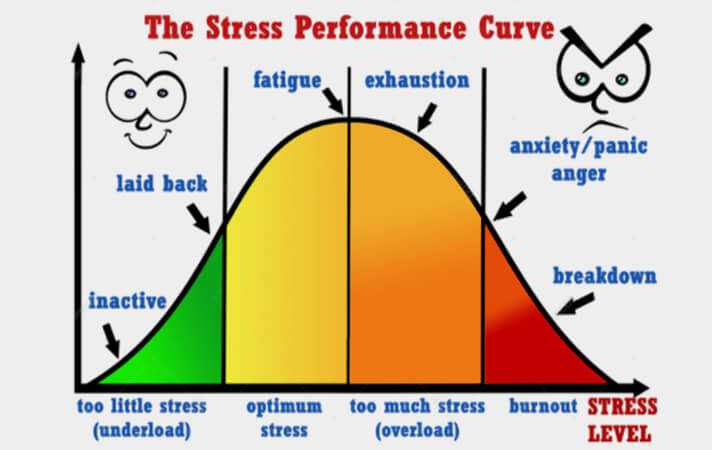Stress, performance, and awareness
Did you know that work is the number one cause of stress? And were you aware that two-thirds of people with a mental health problem believe that workplace stress contributed to their illness? They believe long hours, unrealistic deadlines, or bad management either caused or exacerbated their condition.
Now I am not going to comment on the last point but in our industry, the first two are not only common, they are inevitable!
Stress is a powerful and natural response to mental or emotional pressure, it is subjective, what causes one person to feel stressed may not affect someone else. It is unique to us all; we all view it through a difference lens.
Have you heard people talk about needing stress to motivate them to get the job done? You may even have heard people talk about good stress, but what does that mean, surely stress cannot be a good thing?
There is a fine line between stress that motivates and distress that impedes us and so its worth exploring this relationship. One such model highlighting the relationship between stress and performance was developed by psychologists Robert Yerkes and John Dodson in 1908. The stress and performance curve is a bell-shaped trajectory that charts this relationship. It is known as the Yerkes–Dodson law and it dictates that performance increases with pressure, but only up to a point! When pressure becomes too much our performance is affected and decreases.
Pressure or stress levels run along the bottom of the curve and performance runs from the bottom to top, with various zones spread along the curve.

In the first stage pressure levels are low and can lead to boredom, if a task is too easy or there are no deadlines or targets to meet then our performance tends to be poor. You may be able to relate to this by thinking about those slow days we have all experienced, when finishing even the smallest task is an effort, at this point it is easy to feel demotivation and disengaged. ‘’Busy doing nothing, working the whole day through, trying to find lots of things not to do’’
So we do need some pressure to motivate us.
However, as that pressure builds, we move into optimum stress where we feel focused and in flow, firing on all cylinders. We are highly motivated and take challenges in our stride, this is when we are at our period of maximum efficiency. Yet very quickly, when pressure or performance demands become too high, or when we are in a prolonged period of pressure, we become overloaded with stress.
It is at this point where and performance starts to deteriorate, we become more reactive and anxious, and mistakes start to happen. It becomes more difficult to manage emotions and feelings, all of which can trigger a further downward spiral into burnout and eventually breakdown.
When we are overloaded with stress or in the early stages of burnout it is easy to focus too much on the task at hand and not on yourself or the team, getting the job done becomes the priority. This is when we falsely believe our performance will improve if we keep working harder. The reality is that rather than getting better and better, our performance decreases, we lose focus, we frantically multitask, make mistakes and the quality of our work suffer – smart people start doing stupid things!
So, my questions to you are ‘where are you on the curve right now?’ and ‘where do you spend most of your time?’.
By answering these questions truthfully, you are at the first stage of managing and reducing your stress levels because self-awareness is the first step to self-regulation.
I have written on several occasions about ways you can reduce stress and improve emotional wellbeing and so let us revisit some of those articles which you will find on the NFDC Mental Health hub:
- ‘Our Irreversible Journey’ highlights the simple but effective breathing technique designed to reduce the intensity of a stress response, and what is more it can be used eyes open, in the moment and without anyone know you are doing it. Just remember to use it!
- The ‘Five ways to wellbeing’ developed by the New Economics Foundation are a set of evidence-based strategies that have been shown to improve our mental health and wellbeing.
- The ‘10 habits to keep your brain healthy’ provides simple and effective lifestyle suggestions that help to release stress and improve your mental health and wellbeing.
- Finally, it is worth noting that keeping our stress levels at bay can be hard however in the article ‘Keeping calm amongst the chaos’ I discuss some keys to good stress management, be that building emotional strength, having a good social network, being in control of the situation, and embracing a positive outlook.
When I am feeling overwhelmed, stressed, or anxious I try to remind myself of this quote by Maureen Killoran who said
“Stress is not what happens to us. It is our response to what happens. And response is something we can choose”
Dave Price,
Managing Director,
Vector Equilibrium Ltd